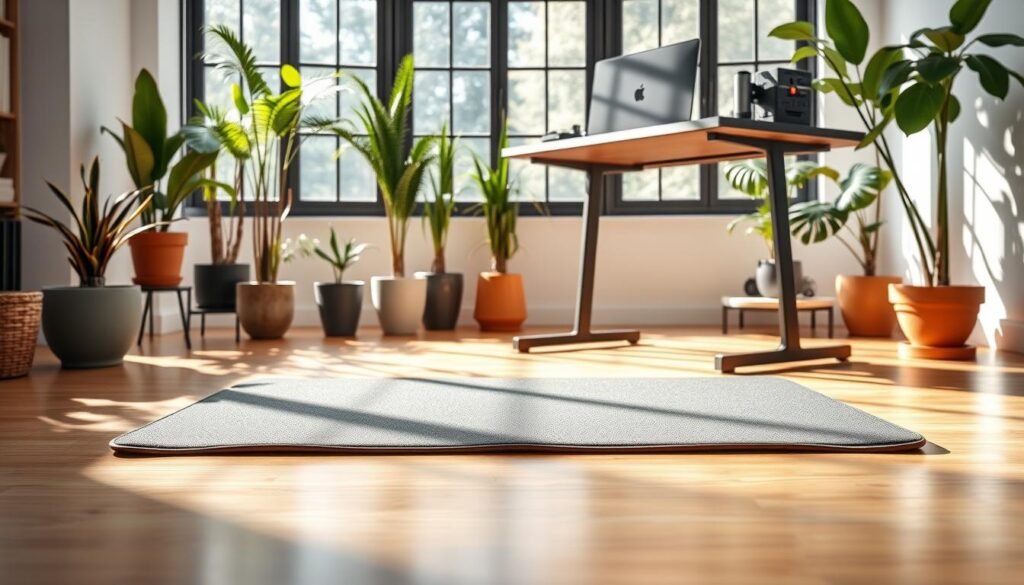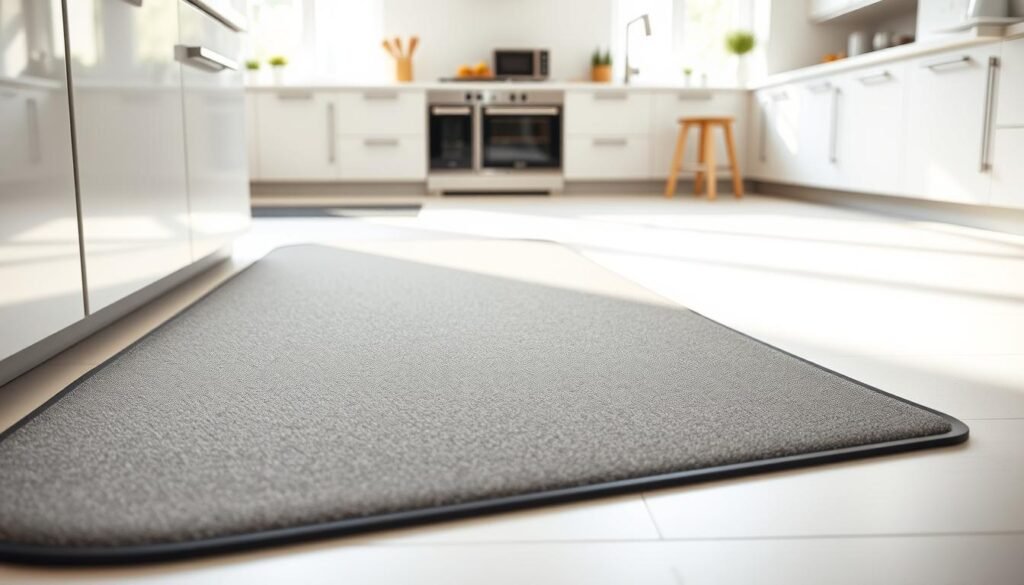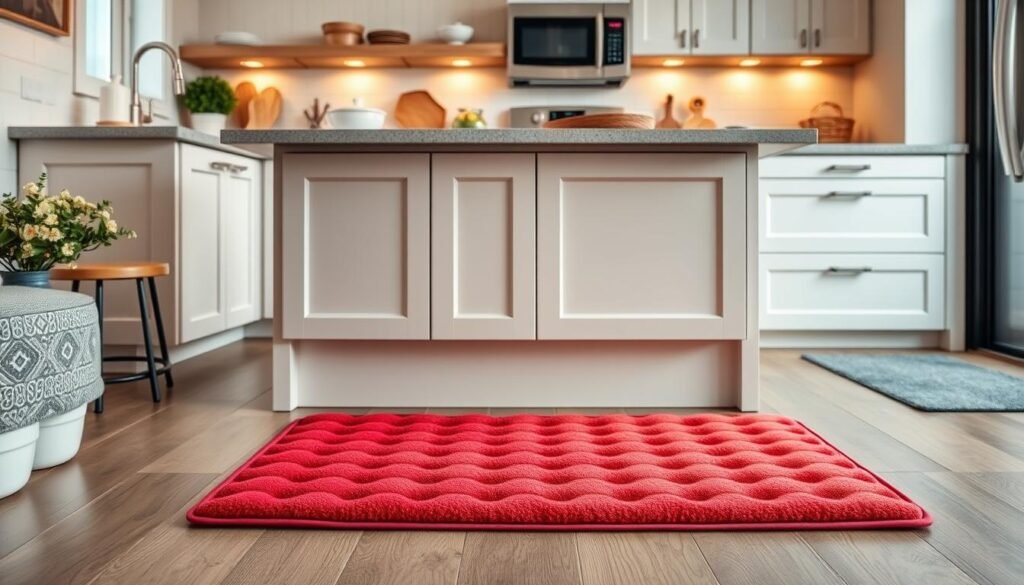About 30% of retail workers suffer from foot fatigue. This fact shows how important anti-fatigue mats are for comfort and health. Yet, many don’t pay attention to this need. Standing for hours, whether in busy kitchens or using standing desks, is tough. But the right anti-fatigue mat can lower discomfort and boost how well you work. The ideal mat lessens joint pain and helps you do your tasks better. Through this article, you’ll learn why these mats matter, how to pick the best one, and explore top products.
Key Takeaways
- Anti-fatigue mats can reduce foot fatigue, enhancing workplace comfort.
- Thickness of anti-fatigue mats varies from 0.5 inches to 3 inches, affecting support levels.
- The right mat contributes to higher employee morale and productivity.
- Features like slip resistance and easy cleaning are vital for safety and maintenance.
- Testing revealed that many mats come with warranties of five years or more, indicating durability.
Understanding Anti-Fatigue Mats
Anti-fatigue mats are special foam mats designed to reduce discomfort. They are perfect for people who stand a lot on hard surfaces like cement. Studies show standing too long can cause fatigue and discomfort, especially on hard floors.
These mats help you stand better and move your legs a little. This reduces joint and muscle pressure and improves blood flow. Using an anti-fatigue mat can make standing for long periods much more comfortable in places like kitchens and workplaces.
These mats also lessen the impact on your feet when you walk. They have sloped edges to prevent tripping and make it easier to move carts. They are important for safety and should be used with shoes that support your feet well. This ensures you stay comfortable and safe when standing for a long time.
| Feature | Description |
|---|---|
| Thickness | Typically between 0.75 inches and 0.9 inches |
| Common Sizes | 20 x 32 inches, 20 x 39 inches, 24 x 70 inches |
| Weight Range | 3 pounds to 17 pounds depending on the model |
| Durability | Some mats feature abrasion-resistant surfaces for increased longevity |
| Cleaning | Materials may vary; some are stain-resistant for easier maintenance |
Choosing the right anti-fatigue mat means knowing what you need based on where you’ll use it. Mats for kitchens might be different from those for industrial areas. Thinking about your specific needs will help you find a mat that improves comfort at work.
Benefits of Using Anti-Fatigue Mats
Adding an ergonomic standing mat to daily life brings many benefits. It’s great for those who stand a lot during the day. These mats help reduce the tiredness that comes from standing too long. Studies show they can lessen fatigue by half. They also help ease pain in the feet, legs, and lower back.
Anti-fatigue mats encourage you to move. This helps with blood flow and lowers stiffness in the legs. Even standing for 90 minutes can make you uncomfortable. These mats make standing at work less of a pain and boost productivity.
One key advantage of these mats is their ability to prevent slips. This is important for keeping safe in places like kitchens and shops where spills happen. The slip-resistant feature helps avoid accidents at work.
Not only do they make work safer, but they also have long-term health perks. They can reduce the chance of joint pain, varicose veins, and even heart problems. People also miss fewer days of work, which is good for business.
Choosing the right size mat is crucial. Sizes like 20″ x 30″ x 0.75″ fit different work areas well. A lot of these mats come with a 15-year warranty, showing they are made to last.
For more details on how anti-fatigue mats help at work, look at this resource on anti-fatigue matting solutions for workplace comfort.

How Anti-Fatigue Mats Work
Anti-fatigue mats provide a cushioned layer. This feature encourages slight movements of the feet. Such movement boosts blood flow and eases joint pain for long-standing workers, making these mats vital for workspaces.
Standing uses 20 percent more energy than sitting. That’s why tools like comfort standing mats are needed. They help reduce the strain of standing for too long.
These mats aim to lessen standing trauma by having the right compression. Mats with 20% to 60% compression deflection offer the best support. Materials like PVC, rubber, and polyurethane are key for durability and comfort.
Users often notice more comfort and less back pain or leg swelling. This proves the mats’ effectiveness.
Studies, including one with 10 investigations, show these mats cut down on musculoskeletal pain from standing. For instance, in one study, 15 out of 16 people felt less back pain using these mats. Safework Australia found that 60% of muscle discomfort claims are work-related. This fact highlights why choosing the right anti-fatigue mat is crucial for different jobs.
Adding a comfort standing mat helps lower health risks from standing long periods. This is especially true in busy sectors like retail, manufacturing, and the kitchen industry. For tips on picking the best mat, visit this resource. It offers advice on features and materials.
Choosing the Best Anti Fatigue Mat
When you’re picking the best anti-fatigue mat, think about a few key features. These include thickness, density, and texture. They affect how comfortable and effective the mat is. Especially for those who stand a lot.
Make sure to look at each aspect closely while choosing. It can make a big difference in your comfort and the mat’s life.
Key Features to Consider
- Thickness: Mats come in various thicknesses. Those between 5/8″ and 3/4″ usually offer the best support.
- Density: A denser mat stays comfy longer, even under a lot of foot traffic.
- Texture: Good mats are slip-resistant and comfortable. They should feel soft yet supportive.
- Durability: Mats made for heavy-duty use last longer than those meant for lighter use.
Materials Used in Anti-Fatigue Mats
Anti-fatigue mats are made from different materials. Common ones include PVC, rubber, and polyurethane. Each has its pros. For instance, polyurethane mats offer great cushioning and last a long time.
Choose based on what you need and where you’ll use it. For kitchens, you might want a mat that can handle oil and is easy to clean. To see the best mats, look at tests done over six months here.

Types of Anti-Fatigue Mats for Various Environments
There are many anti-fatigue mats to choose from, each suited for different spaces. In places like kitchens and offices, the right mat can make a big difference in comfort. You’ll find cushioned kitchen mats and ergonomic standing mats among the most popular.
Cushioned Kitchen Mats
Cushioned kitchen mats are great for those who cook or clean a lot. They help ease foot pressure and are easy to wash. Plus, they’re slip-resistant, making them perfect for active kitchens.
These mats are also stylish, fitting well with your kitchen’s look. They offer both comfort and style, enhancing your kitchen’s feel.
Ergonomic Standing Mats
Ergonomic standing mats are a must where you stand a lot at work. They lessen strain in offices and factories. These mats are slip-proof and stop germs from growing.
Getting one of these mats can make work easier. It aids in circulation and lessens tiredness, making long hours more manageable.

Top Picks for Anti-Fatigue Mats
Finding the right anti-fatigue mat improves comfort while standing for long periods. Several have stood out for their features, support, and value. These are the best choices out there.
Best Overall Option
The Ergodriven Topo Comfort is the top pick, thanks to its 2.7-inch thickness. It’s 26.25″ x 29″ in size, designed to boost circulation. It’s perfect for those standing all day.
Best Value for Money
The Clever Productions Anti-Fatigue Mat is great for those on a budget, at about $34. It measures 24.5″ x 26″ and is 3 inches thick. It combines affordability with comfort, and has massage beads for added foot relief.
Best Firmness and Support
The FEZIBO Anti-Fatigue mat stands out for its firmness, priced around $80. It’s 12″ x 20″ and 2.2 inches tall, ideal for those who want support. The tilting feature encourages moving, great for an active stance.
| Mat Name | Price | Dimensions | Thickness |
|---|---|---|---|
| Ergodriven Topo Comfort | $109 | 26.25″ x 29″ | 2.7″ |
| Clever Productions Anti-Fatigue Mat | $34 | 24.5″ x 26″ | 3″ |
| FEZIBO Anti-Fatigue | $80 | 12″ x 20″ | 2.2″ |
Choosing from these options will make standing more comfortable. They help reduce fatigue and improve posture. For more options, check out the best anti fatigue mat collection online.
Maintenance Tips for Anti-Fatigue Mats
Anti-fatigue mats need regular care to work best and last longer. Taking care of them makes your workplace safer. Mats like those for standing desks reduce the stress on your joints from standing a lot.
Here are some top tips for keeping them in great shape:
- Clean the mats every day, especially if a lot of people walk on them. This helps prevent trips and falls.
- Don’t wash them in machines or fold them. This might cause damage.
- When you’re not using the mats, keep them flat, hang them, or roll them softly. This helps avoid harm.
- For cleaning, use gentle soaps and warm water. This keeps the mats in good condition.
- Make sure the mats are completely dry before you use them again. This reduces the risk of slipping.
Checking the mats often for any signs of damage is crucial. Many mats get ruined too soon if not handled right. As many as 70% of safety leaders say their mats don’t last as long as they should. A regular check-up system can help fix this problem well.
Stick to these tips to make your anti-fatigue mats last longer and perform better. A good maintenance routine makes everyone’s work area more comfortable and safer.
| Maintenance Task | Frequency | Best Practices |
|---|---|---|
| Regular Cleaning | Daily | Use damp cloth and mild detergent |
| Storage | As Needed | Lay flat or roll carefully |
| Inspection | Monthly | Check for wear and tear |
| Drying Before Use | Every Use | Ensure mats are completely dry |
Customer Reviews and Experiences
Customer feedback is key in assessing fatigue reducing mats. Many notice less fatigue and discomfort with these mats. The right choice depends on personal comfort preferences.
People enjoy different types of mats. Some prefer them firm, while others like them softer. This ensures there’s a perfect mat for everyone.
Reviews rave about the comfort improvement. The House of Noa Nama Standing Mat, for $79, blends style and support. It’s available in various sizes and designs. Its thickness is 0.75″, and it weighs 9.5 lbs.
The KitchenClouds Kitchen Mat is a hit for its price and comfort. Priced at $15, it has over 3,000 5-star reviews on Amazon. It’s lightweight at 1.98 lbs, making it easy to move.
For a top-tier option, the Ergodriven Topo Comfort Mat is $109. It offers unique design and superb comfort. The mat is 26.25″ x 29″ with a maximum thickness of 2.7″ and weighs 8 lbs.
The Amazon Basics Anti-Fatigue Standing Comfort Mat is another excellent choice. For $143, it’s backed by over 6,000 5-star reviews. It’s 20″ x 36″ in size, 0.63″ thick, and weighs 2.6 lbs.
| Mat Name | Price | Dimensions | Thickness | Weight | Reviews |
|---|---|---|---|---|---|
| House of Noa Nama | $79 | 20″ x 32″ to 30″ x 108″ | 0.75″ | 9.5 lbs | Varied Designs |
| KitchenClouds Kitchen Mat | $15 | 17.3″ x 28″ to 17.3″ x 39″ | 0.47″ to 0.75″ | 1.98 lbs | 3,000+ 5-star |
| Ergodriven Topo Comfort Mat | $109 | 26.25″ x 29″ | 2.7″ | 8 lbs | Highly Rated |
| Amazon Basics Comfort Mat | $143 | 20″ x 36″ | 0.63″ | 2.6 lbs | 6,000+ 5-star |
When picking a standing mat, comfort rules. People say these mats really help. They lessen stress on muscles and joints. These ergonomic mats are great for well-being.
Conclusion
Finding the right anti-fatigue mat can make a big difference for those who stand a lot. More than half of working Americans suffer from back pain each year. This shows how crucial good mats are for easing pain. Knowing what to look for in these mats helps people choose the best one for their needs, improving their day-to-day comfort and health.
A good mat is key whether you’re in a busy kitchen or using a standing desk. The best ones fit different body weights and are thick enough to help with blood flow and lessen tiredness. Choosing a durable mat means you won’t have to replace it often. This saves money and keeps you comfortable longer.
In short, picking the right anti-fatigue mat can boost focus and work output. By valuing quality and the right fit, you can tackle the problems of standing too long. This leads to a better, more enjoyable experience wherever you are.